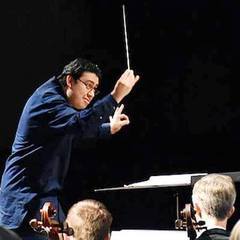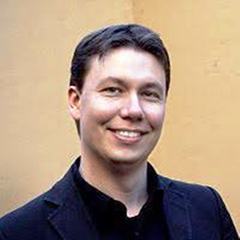|
Back
Vocal Power, Vocal Glory New York
All Souls Church
05/20/2018 -
“Sunrise in the City”:
Maarten Spruijt: Thurémin
Elena Ruehr: Ars Poetica #1002(World premiere)
Gustav Mahler: Ich bin der Welt abhanden gekommen (arranged by Clytus Gottwald)
Ola Gjeilo: Sunrise Mass
Aeolus Quartet: Nicholas Tavani, Rachel Kitagawa Shapiro (Violins), Caitlin Lynch (Viola), Alan Richardson (Cello)
Musica Viva Choir and Orchestra, Alejandro Hernandez-Valdez (Conductor)

A. Hernandez-Valdez
Musica Viva is one of the many choirs in New York providing the most eclectic programs, and yesterday afternoon was no exception. Three of the four composers were entirely new to this listener, and the fourth composer, Gustav Mahler, was presented in a new dress which made it almost unrecognizable.
Yet no matter what the music. Conductor Alejandro Hernandez-Valdez is a dynamic force in choral music. Like most choral conductors, he needed no baton, his 37-voice ensemble well balanced, colorful, and, within the always tricky audio of a church, was resonant when needed, tranquil during those rare moments of this forceful concert, when tranquility was desired.
The first work, Thurémin by the Dutch composer Maarten Spruijt, had been premiered by the Latvian Choir, but this was obvious. The minor-seconds, the rising and falling of the emotional feeling, was pure Arvo Pärt, (and part Penderecki), yet Mr. Spruijt had a surprise. The text was almost meaningless.
I would like to say that the words “Salvomay” and “Donánmin” were parodies of religious words, except that the Parody Mass is a most serious term for 14th Century music. Yet it was an exhilarating start, enhanced by strings and percussion.
The following Ars Poetica #1,002: Rally was written by Elena Ruehr, another name unknown to me. She was in the audience (congregation?) as she will be on Friday night for a piano recital at BargeMusic, and it will be interesting to see if her music has the toughness, the virility of this work.
Then again, this composition, commissioned for the concert, had a tough virile text, a poem by Elizabeth Alexander, so imagic and so muscular in the picture of a protest rally about the Second Gulf War that Ms. Ruehr had no choice but to almost shout out her choral tones. I wish there were room here to quote the entire poem. It deals with the rally, yes, but also the state of the earth, the slaps of the mother, after when she “soothes the sting, smooths the earth we trample daily”. The composer’s notes were never actually declamatory, they had the simulacrum of declaration, even resistance.
Originally I was drawn to this concert by the third work, a choral transcription by one Clytus Gottwald, of the third of five poems by Friedrich Rückert set by Gustav Mahler, “I am lost to the world”. Mr. Gottwald, I discovered, has also set Mahler’s Adagietto and some Johann Strauss for chorus, and I have nothing against that, any more than one would resent Bach’s transcription of other music.
Yet...yet...well, the song set here is so gorgeous, so soaring, so very very personal, that a good singer can almost speak the words, for its power to be felt.
By definition, when 37 singers handle this poem and this music, the original almost unbearable torment is denied. When a solo singer intones “I live alone in my heaven, in my love and my song,” the close harmonies (and the one time when the sopranos were almost shrill) loses the heavenly isolation, the torment of the original. It was painful to hear.

O. Gjeilo
(© Courtesy of the Artist)
The second half of the program was devoted to an astonishing work by Ola Gjeilo. Norwegian-born, Juilliard trained, a full-time composer, his Sunrise Mass was based on the usual Catholic litany, but the divisions–in testament to the “Sunrise in the City” theme–had English names . “The Spheres” was the Kyrie, “Sunrise” was Gloria, “The City” was Credo, “Identity & The Ground” was the finale Sanctus and Agnus Dei.
The relationship may have had a meaning for the composer, but they remained cryptic to this listener. What was not enigmatic was the full-blown emotional all-powerful reading for chorus and orchestra. Mr. Gjeilo may not wear his heart on his sleeve, but his unfettered feelings were spelled out on every measure of the work.
The Mass was never bombastic, his harmonies were modern but never grating, the voices of the Musica Visa Choir and the splendid strings of the orchestra pulsated with life from beginning to the final Dona nobis pacem.
Yes, those final words were relatively quiet, but the rest of the Mass was dynamic, luscious and–can I use these words in relation to the Catholic Mass?–almost salaciously lubricious.
Mr. Gjeilo obviously loves the human voice, and, while I was looking for a few measures of respite, he never surrendered to breathing space. Granted, Berlioz and Verdi masses were just as showy, but they used brass choirs. Mr. Gjeilo made the church rafters ring with voice and strings.
Harry Rolnick
|